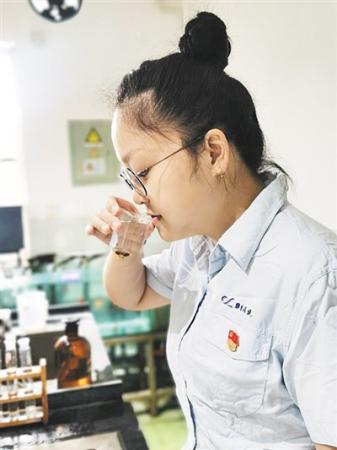Tasted tea and wine, but what is "water tasting"
Photo courtesy of Wang Lanying "Pin Shui" interviewee
During the Mid-Autumn Festival that just passed, I wonder if you have eaten a mouthful of sweet mooncakes against the full moon, and then tasted a pot of good tea.
Speaking of tea tasting, there seems to be a lot of attention, but did you know that not only tea can be good, but water can also be good.
Not long ago, a post-90s quality master from a water company affiliated to Chengdu Environment Group became popular online.
So how exactly is water tasted?
What can you taste?
On October 10th, a reporter from Science and Technology Daily approached the "Pin Shui Master" to take you to find out.
This is how the quality artist works
The "Drinking Water Standard Verification Law" divides the smell of water into 6 levels.
Grade 0 has no smell; Grade 1 has a weak smell; Grade 2 has a weak smell; Grade 3 has a clear smell; Grade 4 has a significant smell; Grade 5 has a relatively strong stench or peculiar smell.
Ordinary people can only distinguish 2-5 grade water, and 0-1 grade water, I am afraid that only the taster who is sensitive to smell can distinguish it.
"Our usual job is to sample the water in the production process, and then do smell detection. If we find an abnormality, we will deal with it according to the company's emergency response plan." Wang Lanying, chief "water quality engineer" of the water company of Chengdu Environment Group Say.
The water quality process of a water taster can be summarized as "one smell, two taste, three views of beauty".
"Smell, after taking a water sample, according to different testing requirements, it is divided into cold water odor detection and hot water odor detection; tasting, after sampling the water, it is necessary to taste the taste of the tap water; After sampling the water, compare the colorimetric tubes to see the chromaticity of the water." Wang Lanying said.
Later, Wang Lanying demonstrated to reporters the process of drinking water.
In the five water pipes in front of her, there were water samples that were important links in the production process of the water plant. She first took 4 water samples and heated them to a slight boiling point, and then detected whether they had peculiar smell through smell; The fifth tube is connected to a glass of factory water, including the entrance for perception; then compare the previously extracted water sample with the color standard series to determine the color of the water sample, and finally record the smell and color test results in the book. Wang Lanying and his colleagues have to do such a testing process every half an hour.
This is how the quality master made
In the past, the smell detection work of the water company affiliated to Chengdu Environment Group was done part-time by the water plant laboratory staff and the front-line operation staff.
Due to differences in human sense of smell and taste, the accuracy of the test results may be affected.
In order to further control the safety of tap water quality, in recent years, the tap water company has established an evaluation mechanism for odor detection capabilities, and subdivided quality water engineers from the company's water plant operation and laboratory testing positions.
Wang Lanying was trained by an operator on duty repeatedly and strengthened smell recognition, and established conditioned reflex in more than 40,000 smell detections, and received professional training in laboratory knowledge, smell detection ability test and other tests. Later, became a water quality master.
The strict testing process also places high demands on the quality engineer.
In order to maintain a sensitive sense of smell and a high degree of taste recognition, "Pink watermen must not smoke, use perfume, aromatic skin care products, and must not eat odorous condiments (such as garlic). Avoid contact with strong volatile odors (such as gasoline, Citrus) and so on." Wang Lanying said that in addition to these rules, to become a qualified water quality expert, you must have a good sense of smell, high taste, good vision, and be careful, patient, and have a high sense of responsibility.
"Because work depends on the nose and mouth, we must take care of them in our daily life."
Pinshui is an instrument that cannot be replaced
It is understood that tap water that meets the 106 index limits of GB5749-2006 "Sanitary Standards for Drinking Water" is qualified tap water.
The qualified tap water should be colorless, odorless, and odorless (except for the normal chlorine smell) liquid.
But some people may ask: Now that there are very advanced instruments that can detect the quality of water, what else do you need to do?
First of all, among the 106 water quality standards listed in the "Sanitary Standards for Drinking Water", most of the tap water indicators can be tested by various analytical instruments and equipment.
But there is one of the sensory indicators of smell and taste, which needs to be perceived and recognized based on human smell and taste. Currently, there is no equipment that can replace these two sensory abilities of humans, and it must be completed through manual testing.
Secondly, drinking water does not have a strong smell like perfume, durian, etc., so it is difficult to judge the smell level of drinking water.
Because of this, the profession of water quality master is needed.
"Different from tasters and smellers who judge the special taste and smell of wine and perfume itself, the main task of tasters is to identify any abnormal smell and taste in tap water other than normal chlorine." Chengdu Environment Group The relevant person in charge of the affiliated water company explained that the water quality engineer is more like an early warning officer. Compared with instrumental testing, to a certain extent, it can more directly and quickly comprehensively evaluate water quality risks for quick disposal.

